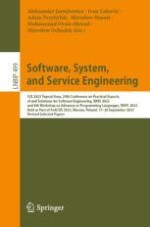2024 | OriginalPaper | Buchkapitel
A Reusability-Oriented Use-Case Model: Textual Specification Language
verfasst von : Bogumiła Hnatkowska, Piotr Zabawa
Erschienen in: Software, System, and Service Engineering
Verlag: Springer Nature Switzerland
Aktivieren Sie unsere intelligente Suche, um passende Fachinhalte oder Patente zu finden.
Wählen Sie Textabschnitte aus um mit Künstlicher Intelligenz passenden Patente zu finden. powered by
Markieren Sie Textabschnitte, um KI-gestützt weitere passende Inhalte zu finden. powered by
